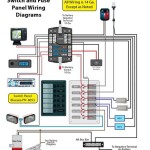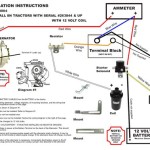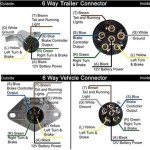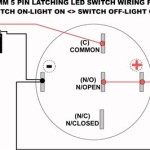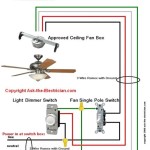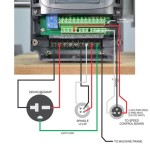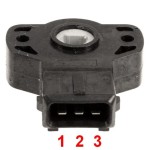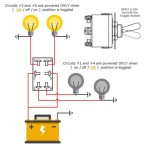A wiring kit for a trailer is a collection of electrical components and wires used to connect the trailer’s electrical system to the towing vehicle’s electrical system. For instance, a typical trailer wiring kit may include a 4-pin or 7-pin connector, a length of wire, and various connectors for attaching to the trailer’s lights, brakes, and other electrical components.
Wiring kits for trailers serve a critical role in ensuring proper communication between the towing vehicle and the trailer, enabling functions such as lighting, braking, and turn signaling. By providing a standardized and reliable connection, wiring kits enhance the safety and functionality of trailers on the road.
Historically, the development of standardized trailer wiring kits has been key in streamlining the process of connecting trailers to towing vehicles. Early trailers relied on ad-hoc wiring configurations, which could lead to electrical issues and safety hazards. The introduction of standardized wiring kits, such as the 4-pin and 7-pin connectors, has greatly simplified and improved the reliability of trailer electrical connections.
This article delves further into the benefits, types, and installation considerations of wiring kits for trailers, providing guidance to ensure safe and efficient electrical connections between towing vehicles and trailers.
The essential aspects of a wiring kit for a trailer play a critical role in ensuring the safe and reliable connection between the towing vehicle and the trailer. These aspects encompass various dimensions, each with its own significance and contribution to the overall functionality of the wiring kit.
- Connector Type: 4-pin, 7-pin, or custom configurations.
- Wire Gauge: Determines the current-carrying capacity and voltage drop.
- Wire Length: Sufficient length to reach all trailer components.
- Connectors: Spade terminals, bullet connectors, or other types for secure connections.
- Grounding: Proper grounding ensures electrical safety and functionality.
- Circuit Protection: Fuses or circuit breakers to protect against electrical overloads.
- Compatibility: Matching the wiring kit to the specific trailer and towing vehicle.
- Durability: Weather-resistant materials and construction for longevity.
- Ease of Installation: Clear instructions and user-friendly design for efficient installation.
Understanding these key aspects is crucial for selecting the right wiring kit for a trailer and ensuring its proper installation. By considering factors such as connector type, wire gauge, and compatibility, it is possible to achieve a reliable and safe electrical connection between the towing vehicle and the trailer, enabling essential functions such as lighting, braking, and turn signaling.
Connector Type
The connector type plays a critical role in the compatibility and functionality of a wiring kit for a trailer. Wiring kits are designed to match the specific connector type required by the towing vehicle and the trailer. The most common connector types are 4-pin and 7-pin, with custom configurations available for specific applications.
The 4-pin connector is commonly used for basic lighting functions, including taillights, brake lights, and turn signals. It is suitable for small trailers that do not require additional electrical features. The 7-pin connector, on the other hand, provides more functionality, supporting additional features such as reverse lights, electric brakes, and auxiliary power. It is commonly used for larger trailers, caravans, and boat trailers.
Choosing the correct connector type is essential to ensure proper electrical communication between the towing vehicle and the trailer. Using an incompatible connector type can lead to malfunctioning lights, braking issues, or even electrical hazards. Therefore, it is important to verify the connector types on both the towing vehicle and the trailer before selecting a wiring kit.
In summary, the connector type is a critical component of a wiring kit for a trailer, determining the compatibility and functionality of the electrical connection between the towing vehicle and the trailer. Proper selection and installation of the correct connector type are essential for safe and reliable operation of the trailer’s electrical system.
Wire Gauge
In the context of wiring kits for trailers, the wire gauge is a critical factor that directly affects the functionality and safety of the electrical system. Wire gauge refers to the thickness of the electrical wire, which determines its ability to carry current and withstand voltage drop. A thicker wire gauge (lower number) indicates a higher current-carrying capacity and lower voltage drop, while a thinner wire gauge (higher number) indicates a lower current-carrying capacity and higher voltage drop.
For a wiring kit for a trailer, selecting the appropriate wire gauge is crucial to ensure that the electrical system can handle the current draw of the trailer’s lights, brakes, and other electrical components. Using a wire gauge that is too thin can lead to excessive voltage drop, resulting in dim lights, malfunctioning brakes, or even electrical fires. Conversely, using a wire gauge that is too thick may be unnecessarily expensive and bulky.
Real-life examples of the importance of wire gauge in wiring kits for trailers include:
- A trailer with a high power draw, such as one with electric brakes and multiple LED lights, requires a wire gauge that can handle the higher current draw to prevent voltage drop and ensure proper functioning of the electrical system.
- A long trailer requires a thicker wire gauge to minimize voltage drop over the extended length of the wiring.
- A trailer that will be used in harsh conditions, such as off-road or in extreme temperatures, may require a heavier wire gauge to withstand the additional stress.
Understanding the relationship between wire gauge and current-carrying capacity is essential for selecting the right wiring kit for a trailer and ensuring its safe and reliable operation. By choosing the appropriate wire gauge, it is possible to prevent electrical issues, improve the performance of the trailer’s electrical system, and enhance the overall safety of the towing experience.
Wire Length
In the context of “Wiring Kit For A Trailer”, the aspect of “Wire Length: Sufficient length to reach all trailer components” plays a crucial role in ensuring the proper functionality and safety of the trailer’s electrical system. Adequate wire length allows for a secure and reliable connection between the towing vehicle and the trailer, enabling the uninterrupted flow of electrical power to all essential components.
- Coverage of All Components: The wire length must be sufficient to reach all electrical components of the trailer, including lights, brakes, turn signals, and any additional accessories. Insufficient length can lead to incomplete connections, malfunctioning components, or even electrical hazards.
- Proper Routing: Adequate wire length allows for proper routing of the wiring harness, ensuring it is protected from damage and wear. This includes avoiding sharp bends, excessive or compression, and exposure to heat sources.
- Future Modifications: Choosing a wiring kit with sufficient wire length provides flexibility for future modifications or additions to the trailer’s electrical system. This eliminates the need for splicing or adding extension wires, which can compromise the integrity and safety of the electrical connection.
- Voltage Drop Minimization: Longer wire lengths can contribute to voltage drop, especially when dealing with high current draw components. Adequate wire length helps minimize voltage drop, ensuring that all components receive the necessary voltage to operate correctly.
In summary, the aspect of “Wire Length: Sufficient length to reach all trailer components” is essential for the proper functioning and safety of a wiring kit for a trailer. By selecting a wiring kit with adequate wire length, it is possible to ensure a reliable connection, proper routing, flexibility for modifications, and minimization of voltage drop, ultimately enhancing the overall performance and safety of the trailer’s electrical system.
Connectors
In the context of “Wiring Kit For A Trailer”, the aspect of “Connectors: Spade terminals, bullet connectors, or other types for secure connections” holds significant importance, ensuring the reliable and safe operation of the trailer’s electrical system. These connectors play a crucial role in establishing and maintaining electrical connections between the towing vehicle and the trailer.
- Types of Connectors: Wiring kits for trailers typically employ various types of connectors, including spade terminals, bullet connectors, and other specialized connectors. Each type is designed for specific applications and provides secure and reliable connections.
- Spade Terminals: Spade terminals are commonly used in trailer wiring kits due to their ease of use and secure connection. They feature a U-shaped design that slides onto the electrical terminal and is secured with a screw or crimp.
- Bullet Connectors: Bullet connectors are another popular choice for trailer wiring kits. They consist of two bullet-shaped terminals that are crimped onto the wire ends and then plugged together to create a secure connection.
- Other Connectors: In addition to spade and bullet connectors, other types of connectors may be used in trailer wiring kits, such as ring terminals, butt connectors, and heat shrink connectors. These connectors are designed for specific applications and provide secure and durable connections.
Choosing the appropriate connectors for a trailer wiring kit is essential to ensure a reliable and safe electrical connection. The type of connectors used should match the specific requirements of the trailer and towing vehicle, and proper installation techniques should be followed to ensure a secure and long-lasting connection.
Grounding
Grounding plays a critical role in ensuring the safety and functionality of the electrical system in a wiring kit for a trailer. It provides a safe path for electrical current to flow, preventing electrical shocks, damage to components, and potential fire hazards. Proper grounding involves connecting the trailer’s electrical system to the ground, typically through the frame or a dedicated grounding wire.
- Electrical Safety: Proper grounding prevents electrical shocks by providing a safe path for stray electrical current to flow. Without proper grounding, electrical current can accumulate on the trailer’s frame or other components, posing a risk of shock to individuals touching the trailer.
- Equipment Protection: Grounding helps protect electrical components from damage by providing a safe path for excess voltage to dissipate. In the event of a short circuit or electrical surge, proper grounding ensures that the excess current flows safely to the ground, preventing damage to sensitive electrical components.
- Real-Life Example: In a real-life scenario, if the trailer’s electrical system is not properly grounded, a short circuit could cause the trailer’s frame to become energized, posing a shock hazard to anyone touching it. Proper grounding prevents this by providing a safe path for the electrical current to flow to the ground.
- Legal Compliance: In many regions, proper grounding is a legal requirement for trailers, as it ensures the safety of individuals using and working around the trailer’s electrical system.
In summary, grounding is a crucial aspect of a wiring kit for a trailer, ensuring electrical safety, protecting equipment, and meeting legal requirements. By providing a safe path for electrical current to flow, proper grounding helps prevent electrical shocks, component damage, and potential fire hazards, enhancing the overall safety and functionality of the trailer’s electrical system.
Circuit Protection
In the context of “Wiring Kit For A Trailer”, circuit protection plays a critical role in ensuring the safety and functionality of the trailer’s electrical system. Electrical overloads can occur due to various factors such as faulty wiring, short circuits, or excessive current draw, leading to potential hazards such as electrical fires or damage to electrical components.
To prevent such occurrences, wiring kits for trailers incorporate circuit protection devices such as fuses or circuit breakers. These devices act as safeguards by interrupting the electrical circuit when an excessive current flow is detected. Fuses are one-time-use devices that break the circuit by melting a thin wire, while circuit breakers are reusable devices that can be reset after tripping.
Real-life examples of circuit protection in wiring kits for trailers include:
- A short circuit in the trailer’s lighting system can cause an excessive current flow, which is detected by the fuse or circuit breaker, interrupting the circuit and preventing damage to the wiring and other electrical components.
- An overloaded electrical outlet on the trailer, caused by connecting too many appliances or devices, can trip the circuit breaker, preventing overheating and potential fire hazards.
Understanding the importance of circuit protection in wiring kits for trailers is essential for ensuring the safety and reliability of the trailer’s electrical system. By incorporating fuses or circuit breakers, wiring kits provide a vital layer of protection against electrical overloads, reducing the risk of electrical fires and safeguarding electrical components. This understanding empowers individuals to make informed decisions when selecting and installing wiring kits for trailers, prioritizing safety and functionality.
Compatibility
The compatibility between the wiring kit and the specific trailer and towing vehicle is a crucial aspect of “Wiring Kit For A Trailer”. Mismatched components can lead to electrical issues, safety hazards, and suboptimal performance. A compatible wiring kit ensures proper communication and functionality between the trailer’s electrical system and the towing vehicle’s electrical system.
Real-life examples underscore the importance of compatibility. Using a wiring kit designed for a different trailer model or a towing vehicle with a different electrical system can result in incorrect lighting, malfunctioning brakes, or even electrical fires. Conversely, a compatible wiring kit allows for seamless integration, ensuring the trailer’s electrical components function as intended.
Understanding the significance of compatibility empowers individuals to make informed decisions when selecting and installing wiring kits for trailers. By matching the wiring kit to the specific trailer and towing vehicle, they can ensure safe and reliable operation of the trailer’s electrical system. This understanding extends to the broader context of vehicle safety, as properly functioning electrical systems are essential for effective communication, illumination, and braking.
In conclusion, compatibility between the wiring kit and the specific trailer and towing vehicle is paramount for the proper functioning and safety of the trailer’s electrical system. Mismatched components can lead to electrical issues, safety hazards, and suboptimal performance. Understanding the importance of compatibility enables informed decision-making and contributes to the safe and reliable operation of trailers on the road.
Durability
In the context of “Wiring Kit For A Trailer”, durability plays a crucial role in ensuring the longevity and reliability of the trailer’s electrical system. Weather-resistant materials and construction are essential for withstanding harsh environmental conditions and maintaining optimal performance over time.
- Corrosion Resistance: Wiring components exposed to moisture and road salts can corrode, leading to poor electrical connections and potential failures. Durable wiring kits employ corrosion-resistant materials like stainless steel or coated copper to prevent rust and ensure long-lasting performance.
- UV Resistance: Prolonged exposure to sunlight can degrade wiring insulation, making it susceptible to cracking and damage. UV-resistant wiring kits feature durable insulation materials that protect against sun damage, ensuring reliable electrical connections in outdoor environments.
- Water Resistance: Trailers often encounter wet conditions, such as rain or splashing water. Water-resistant wiring kits incorporate sealed connections and waterproof components to prevent moisture ingress, minimizing the risk of electrical shorts or malfunctions.
- Temperature Tolerance: Wiring kits must endure extreme temperatures, from freezing winters to scorching summers. Durable wiring kits utilize materials and construction techniques that can withstand wide temperature variations without compromising performance or safety.
By incorporating weather-resistant materials and construction, wiring kits for trailers enhance the durability and longevity of the trailer’s electrical system. This translates into reliable lighting, braking, and other electrical functions, contributing to the safety and functionality of the trailer on the road.
Ease of Installation
In the context of “Wiring Kit For A Trailer”, ease of installation is a critical factor that significantly impacts the overall experience and safety of the electrical connection process. Clear instructions and user-friendly design play a pivotal role in ensuring efficient installation, minimizing errors, and promoting safe operation of the trailer’s electrical system.
Real-life examples demonstrate the importance of ease of installation in wiring kits for trailers. A well-designed wiring kit with clear instructions can guide users through the installation process step-by-step, reducing the likelihood of incorrect connections or electrical hazards. Conversely, a wiring kit with poorly written instructions or a complex design can lead to confusion, errors, and potential safety issues.
Understanding the principles of ease of installation empowers individuals to make informed decisions when selecting and installing wiring kits for trailers. By prioritizing wiring kits with clear instructions and user-friendly designs, they can ensure a smooth and safe installation process, minimizing the risk of electrical problems and maximizing the reliability of the trailer’s electrical system.
In summary, ease of installation is a crucial aspect of wiring kits for trailers, directly impacting the efficiency, safety, and overall success of the electrical installation process. Wiring kits with clear instructions and user-friendly designs empower individuals to confidently and safely connect their trailers to towing vehicles, promoting the reliable functioning of the trailer’s electrical system on the road.









Related Posts

